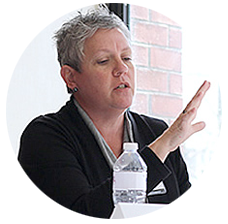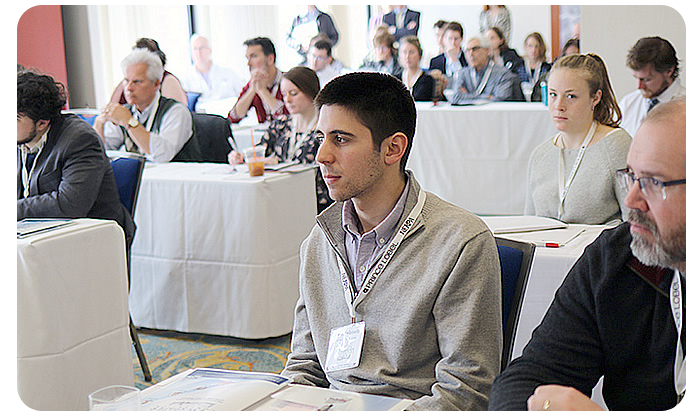By Sofia Bergmann,
Bulletin Correspondent
The audience gasped in disbelief.
“There were photos of busted lips and blood dripping out of their mouths. He would send people home after taking wisdom teeth out without anything to combat the blood … This guy was, is a crook.”
Judith Meyer, executive editor of the Sun Journal of Lewiston, Maine, stunned the audience with a story that emphasized the importance of honest reporting.
She was accompanied by four other panelists Friday, Feb. 24, at a New England Newspaper and Press Association winter convention discussion on “How do you know it’s true, or do you care before printing it?”
And the answer to the second question is yes.
As Meyer said: “The very best stories are the true ones.”
Meyer’s gruesome story about a dentist in Maine who was breaking people’s jaws and busting their lips without anesthesia is an example of a story that required extensive investigation before being published. After reviewing documents provided by the Maine Board of Dental Examiners, the Sun Journal was able to gather more information about the dentist.
In fact, the situation was much worse than what the original tip about the dentist had indicated. When the Sun Journal put a story about the situation online, hundreds of people shared their experiences with photo evidence of the poor treatment they had received. Without the ability to access disciplinary and licensing records, the Sun Journal would not have published the story because that concrete evidence was vital to making such serious accusations, Meyer said.
Meyer was joined by four other panelists: Karen Bordeleau, retired executive editor and senior vice president of The Providence (R.I.) Journal; Mike Donoghue, a veteran journalist and vice president of the New England First Amendment Coalition board; Peter J. Caruso Sr., an Andover, Mass., lawyer; and Jonathan M. Albano, a Boston lawyer who was portrayed in “Spotlight,” the Oscar-winning film about The Boston Globe’s Pulitzer Prize-winning series exposing sexual abuse by Roman Catholic clergy.
Some of the discussion referred to President Donald Trump’s war on the news media.
Meyer said that, as with Trump’s repeatedly accusing the press of sharing false information: “We (journalists) get beat on all the time, and we’ve got to keep our heads up, march on, and stand tall.”
Bordeleau related an example of the importance of being certain about the veracity of a story. She urged the journalists in the audience to tread lightly when dealing with accusations, especially those against public figures.
After having watched a video of two unidentified victims accusing a public official of sexual promiscuity with minors while cross-dressed in the Dominican Republic, she decided not to publish the story.
“Even though it seems so juicy … we’re not touching this because we can’t confirm it, and we never were able to confirm … We could not ding our own reputation, let alone the reputation of other journalists,” Bordeleau said.
Because the video did not contain clear evidence of what was alleged to have occurred and the subjects were unidentifiable, there was not enough proof to back up the claims made to the Journal about the public official, Bordeleau said.
“For all we know, it could have been filmed in a basement in Pawtucket,” Bordeleau said.
Caruso focused on the role the press plays as the Fourth Estate — constantly questioning, doubting, testing and interpreting what’s going on around us.
Caruso said that, having represented many journalists in court and as a former newspaperman himself, he knows firsthand how damaging a false story can be — not only to the reputation of the journalist, but to that of the publication he or she works for and to journalists as a whole.
Albano, having had similar experiences to Caruso’s in his work, re-emphasized his point.
“Believe me, no one wants to go through a libel trial. Talk to any reporter who’s experienced it; it’s the worst possible experience,” Albano said.
Albano shared an example of the gray area that can cloud the judgment of journalists.
“There was once a reporter who published an article that accurately stated that there were rumors on Wall Street that the head of a company was actually a convicted felon,” he said. “Short sellers had been circulating this unverified rumor, and it had caused the stock to go wild.”
Albano said that although it is crucial for published information to be accurate, he made the argument that “given the fact that the rumor had an independent effect on investors, maybe there should be some protection for (journalists) reporting this kind of unverified rumor.”
Donoghue, who moderated the discussion, summed up its main theme with a humorous truism familiar in newsrooms. “When your mother says she loves you, check it out.”
NEWS

‘We (journalists) get beat on all the time, and we’ve got to keep our heads up, march on, and stand tall.’
—Judith Meyer, Executive editor
Sun Journal, Lewiston, Maine

‘Believe me, no one wants to go through a libel trial. Talk to any reporter who’s experienced it; it’s the worst possible experience.’
—Jonathan M. Albano, Boston lawyer


